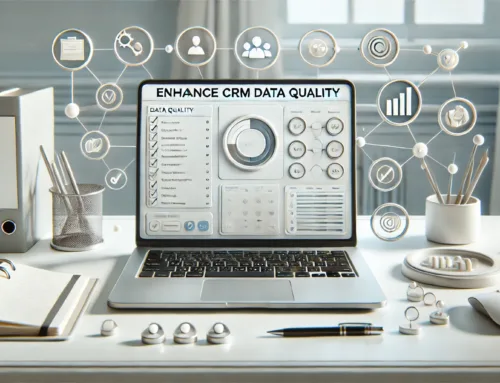To implement CRM data enrichment, did you know that defining clear objectives and selecting the right tool are crucial steps? Understanding how to align data enrichment with your business goals can significantly impact its success. From researching tools to integrating them seamlessly, each stage plays a vital role in optimizing your CRM data. So, how can you ensure a smooth and effective data enrichment process from start to finish? Keep reading to uncover essential strategies for successful CRM data enrichment implementation.
Understand Business Requirements
To successfully implement CRM data enrichment, the first crucial step is to thoroughly understand the specific business requirements. Begin by defining objectives that you aim to achieve through data enrichment. Analyze needs within your organization to determine what kind of data would be most beneficial for enhancing customer relationships. Consider factors such as customer demographics, purchasing behavior, and communication preferences. Understanding these requirements will guide you in selecting the most relevant data enrichment strategies.
Research Potential CRM Data Enrichment Tools
Explore various CRM data enrichment tools available in the market to identify options that align with your organization’s specific needs. When researching potential tools, start by comparing features. Look for tools that offer data cleansing, data validation, and data appending functionalities to ensure comprehensive data enrichment. Consider the scalability and integration capabilities of each tool to guarantee seamless implementation within your existing CRM system.
Additionally, pay close attention to pricing options. Some tools may offer a pay-as-you-go model, while others might require a monthly or yearly subscription. Evaluate the cost-effectiveness of each tool based on your budget and the expected return on investment. Factor in any additional costs for customization, training, or support services to determine the overall affordability of the tool.
Select a Suitable Data Enrichment Tool
After conducting thorough research on potential CRM data enrichment tools and comparing their features, it is now imperative to move forward with selecting a suitable tool for your organization. When choosing a data enrichment tool, prioritize data accuracy and cost efficiency to ensure optimal results. Here are four key factors to consider:
- Data Accuracy: Look for a tool that offers high-quality data enrichment services to enhance the accuracy of your CRM database.
- Cost Efficiency: Evaluate the pricing structure of the tool to ensure it aligns with your budget while providing the necessary features for effective data enrichment.
- Scalability: Choose a tool that can scale with your business needs, accommodating growth and increasing data volumes.
- Integration Capabilities: Opt for a tool that seamlessly integrates with your existing CRM system to streamline the data enrichment process and enhance overall efficiency.
Integrate the Tool With Existing CRM
Upon selecting the most suitable data enrichment tool for your organization, the next crucial step is to seamlessly integrate this tool with your existing CRM system. To achieve this, explore customization options provided by the data enrichment tool. Customization allows you to tailor the tool to fit your CRM’s specific requirements, ensuring a smooth integration process.
Another critical aspect is employing effective data mapping strategies. Data mapping involves aligning the fields and data formats between your CRM and the enrichment tool. By mapping the data accurately, you can guarantee that the enriched information seamlessly integrates into your CRM without any discrepancies.
Before proceeding with the integration, thoroughly understand your CRM’s architecture and the capabilities of the data enrichment tool. This knowledge will guide you in making informed decisions during the integration process. By focusing on customization options and data mapping strategies, you can ensure a successful integration of the data enrichment tool with your existing CRM system.
Test the Data Enrichment Process
To ensure the effectiveness and accuracy of your CRM data enrichment implementation, the next essential step is to rigorously test the data enrichment process. Testing is crucial to guarantee the quality of enriched data and to identify any potential issues that may arise during the enrichment process. Here are four key steps to successfully test your data enrichment process:
- Data Quality Assessment: Conduct thorough checks to ensure that the enriched data maintains high quality and integrity throughout the process.
- Automation Testing: Implement automated testing procedures to streamline the testing process and ensure consistency in evaluating the data enrichment results.
- Validation of Enriched Data: Verify that the enriched data aligns with the desired outcomes and accurately enhances the existing CRM data.
- Error Handling Evaluation: Test the system’s ability to handle errors gracefully and ensure that any issues encountered during the enrichment process are appropriately addressed.
Frequently Asked Questions
Can CRM Data Enrichment Improve Customer Loyalty and Retention Rates?
Yes, CRM data enrichment can enhance customer loyalty and retention rates by enabling effective customer segmentation. Through personalized marketing strategies tailored to individual preferences, you can build stronger relationships, increase engagement, and ultimately boost customer satisfaction and loyalty.
How Can Data Enrichment Tools Enhance Lead Scoring Accuracy?
Imagine your lead scoring optimization as a puzzle. Utilize data segmentation strategies to identify key attributes. Data enrichment tools enhance lead scoring accuracy by providing detailed insights for better decision-making, leading to improved targeting and conversion rates.
What Are the Best Practices for Maintaining Data Quality Post-Enrichment?
After enriching data, ensure data quality by regularly performing data cleansing to remove duplicates and inaccuracies. Implement data validation procedures to maintain accuracy. Monitor data entry processes to uphold high-quality standards and maximize CRM effectiveness.
Is It Possible to Customize Data Enrichment Criteria for Specific Industries?
Yes, it’s indeed possible to customize data enrichment criteria for specific industries. By tailoring enrichment strategies to target industry-specific needs, you can enhance the relevance and accuracy of your CRM data, ultimately improving decision-making and customer engagement.
How Can GDPR Compliance Be Ensured During the Data Enrichment Process?
Ensuring GDPR compliance during data enrichment is crucial. Prioritize data privacy and security. Regularly review processes to align with regulations. Implement encryption, access controls, and anonymization techniques. Train staff on compliance measures. Stay vigilant for updates and changes in regulations.




